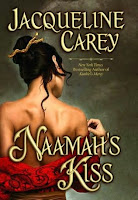
645 pages, suggestion
Let me just come right out and say that I sort of recommended this book to myself. I saw it on the shelf at the library and, being a fan of Carey's work, decided that I
must read this book. There was no way around it - I cleared my schedule and got to reading. Seriously. Now that I come to writing about it, I have to ask myself, how does one sum up a 645 page book in a couple of paragraphs? Particularly one as engaging as
Naamah's Kiss. When I googled reviews of
Naamah's Kiss, almost every single review used the word 'lush' to describe Carey's prose. I couldn't put it better myself. Carey has masterfully created a rich and intriguing alternate history of our own world. Her prose is stunning, and I laughed and cried in various places throughout this book, just because of the beauty of her words.
Naamah's Kiss is the first book in the third trilogy set in Carey's alternate historical world, with at least part of the action taking place in
Terre D'Ange. The first trilogy is the story of
Phedre, and begins with
Kushiel's Dart, and the second trilogy is the story of
Immriel, and begins with
Kushiel's Scion. Because I
really don't think I can sum this one up succinctly, I have included the summary from the book jacket:
FROM THE BOOK JACKET:Once there were great magicians born to the
Maghuin Dhonn; the folk of the Brown Bear, the oldest tribe in Alba. But generations ago, the greatest of them all broke a sacred oath sworn in the name of all his people. Now, only small gifts remain to them. Through her lineage,
Moirin possesses such gifts - the ability to summon the twilight and conceal herself, and the skill to coax plants to grow.
Moirin has a secret, too. From childhood onward, she senses the presence of unfamiliar gods in her life; the bright lady, and the man with a seedling cupped in his palm. Raised in the wilderness by her reclusive mother, it isn't until she comes of age that
Moirin learns how illustrious, if mixed, her heritage is. The great granddaughter of
Alais the Wise, child of the
Maghuin Donn, and a cousin of the
Cruarch of Alba,
Moirin learns her father was a
D'Angeline priest dedicated to serving
Naamah, goddess of desire.
After
Moirin undergoes the rites of adulthood, she finds divine acceptance...on the condition that she fulfill an unknown destiny that lies somewhere beyond the ocean. Or perhaps oceans. Beyond
Terre d'Ange where she finds her father, in the far reaches of distant Ch'in,
Moirin's skills are a true gift when facing the vengeful plans of an ambitious
mage, a noble warrior princess desperate to save her father's throne, and the spirit of a celestial dragon.
Having read the other six books set in this universe,
Naamah's Kiss definitely has a different flavor than the
Kushiel books. Perhaps it is because
Moirin is only half
D'Angeline, or perhaps it is because this book deals more with
Naamah than stern
Kushiel. There is still a fair amount of sex in this book, and (as with the other books I have read by Carey) it follows the
D'Angeline precept "Love as thou wilt". One thing I enjoy about Carey's style is that even the sex scenes are beautifully written - cheesy play by play sex scenes of crappy romance novels they are not.
Naamah's Kiss crosses over to many genres - it has elements of romance, high fantasy and alternate history. If it is like her other trilogies, this will also be an epic adventure and love story as well. I highly recommend this author to anyone who is looking for a new fantasy type series to read. And, I think I would start with
Naamah's Kiss rather than her complete series. This one is much easier to follow for someone new to the series, and (as discussed above), the sex scenes are...different in the other books. I give this one a 4.5 out of 5.















